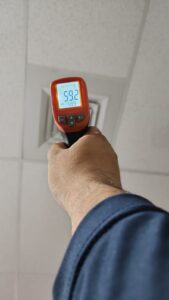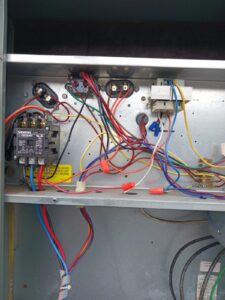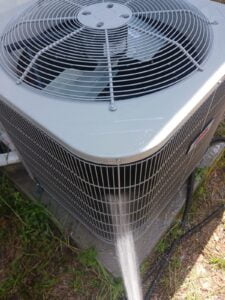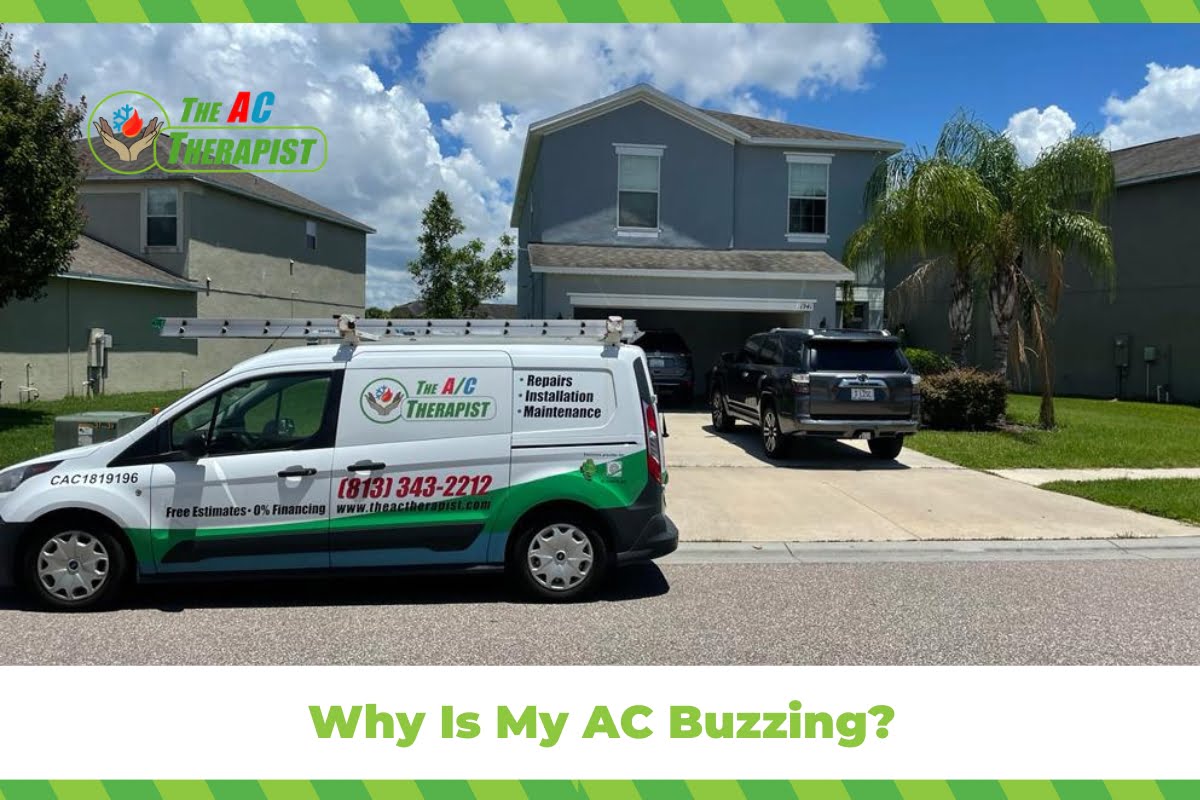Why Is My AC Buzzing?
When the scorching heat of summer sets in, your air conditioning system becomes your sanctuary, providing a welcome respite from oppressive temperatures. However, what happens when this haven of cool air is disrupted by an unsettling buzzing sound? The sound might seem innocuous, but it could be your AC’s way of signaling that something isn’t quite right. In this comprehensive exploration of AC buzzing, we’ll delve into the multifaceted reasons behind this phenomenon, consider its potential implications for your comfort and budget, and provide you with a toolkit of effective strategies to address it head-on.
Understanding AC Buzzing: What’s That Sound?
It’s one thing to hear a buzzing sound emanating from your air conditioning system, but it’s quite another to understand what’s causing it. Picture this: your AC is like a finely tuned orchestra, and any offbeat note could indicate a disruption within the symphony. AC buzzing is often a symptom of an underlying issue rather than a problem in itself. Recognizing the importance of addressing AC buzzing sounds promptly is the first step toward restoring the harmonious equilibrium of your cooling oasis.
Common Culprits Behind AC Buzzing
- Electrical Issues: Loose wiring and connections can be a source of both physical vibration and an audible AC buzzing sound. These vibrations are often transmitted through the system, creating an annoying hum. Moreover, malfunctioning electrical components such as capacitors, relays, and contactors can trigger buzzing, disrupting the flow of electricity vital to your AC’s operation.
- Faulty Components: Like any intricate machinery, an air conditioning system relies on numerous components working in tandem. A malfunctioning fan motor, a central player in circulating cool air, can generate buzzing noises as it strains under the load. The compressor, the heart of your AC, can also be a buzzing culprit when it encounters issues. Additionally, solenoid valves and expansion valves, responsible for regulating refrigerant flow, can cause AC buzzing when they’re not performing optimally.
- Debris and Obstructions: Nature’s elements can infiltrate your AC system, with leaves, dirt, and debris clogging vital components. These obstructions can create airflow disruptions, leading to buzzing as the system grapples to perform efficiently amidst the hindrance. Ensuring a clean and unobstructed system is essential for preventing such buzzing.
- Refrigerant-Related Factors: The refrigerant, a critical element in the cooling process, can also play a role in generating buzzing sounds. Low refrigerant levels can lead to inefficient cooling and the subsequent sound of the system struggling. More concerning are refrigerant leaks, which not only lead to AC buzzing but also impact the efficiency of the AC and your energy bills.

Why is my inside AC unit buzzing when off?
If your inside AC unit is buzzing when it’s turned off, there could be several potential reasons for this unexpected noise. While it’s not a common occurrence, it’s important to address the issue to prevent any underlying problems from escalating. Here are a few possible explanations for why your inside AC unit is buzzing when it’s turned off:
- Electrical Issues: An AC buzzing sound could be due to electrical components that are still receiving power even when the unit is turned off. Faulty contactors, capacitors, or relays might be malfunctioning, causing a continuous electrical connection and the resulting buzzing noise.
- Stuck Relay: Relays are switches that control various components of your HVAC system. If a relay gets stuck in the closed position, it can keep sending power to parts of the system even when it’s supposed to be off, leading to buzzing.
- Thermostat Wiring: Issues with the thermostat wiring can also lead to AC buzzing. If there’s a short circuit or faulty wiring in the thermostat, it can cause electrical fluctuations that result in buzzing sounds.
- Residual Vibrations: Certain components within the AC unit might still be vibrating even after the unit is turned off. This could be due to mechanical issues or worn-out parts.
- Faulty Transformer: The transformer in your HVAC system steps down the voltage for various components. If the transformer is malfunctioning, it could lead to buzzing sounds.
- Interference: Sometimes, external factors such as nearby electrical devices or even electrical interference from outside sources can cause buzzing sounds in your HVAC system.
- Circuit Board Issues: Problems with the control circuit board, which manages the various functions of your HVAC system, could lead to buzzing when the unit is off.
Given the complexity of HVAC systems and the potential safety risks of working with electrical components, it’s advisable to consult a professional HVAC technician to diagnose and address the issue. Attempting to fix electrical problems without proper knowledge and experience can be dangerous. A qualified technician can inspect your system, identify the root cause of the buzzing, and perform the necessary repairs to ensure the safety and optimal functioning of your AC unit.

What does a bad AC compressor sound like?
A bad AC compressor can emit a range of distinct sounds that are not part of the normal operational noises you might expect from your air conditioning system. These sounds can serve as warning signs that the compressor, a crucial component responsible for pressurizing and circulating the refrigerant throughout the system, might be experiencing issues. If you’re hearing any of the following sounds coming from your AC unit, it’s essential to take prompt action to diagnose and address the problem before it escalates into a major malfunction.
- Loud Clicking or Clanking: When your AC compressor turns on or off, you might hear a clicking sound, which is generally normal. This can signal imminent compressor failure and should be investigated by a professional technician.
- Loud Rattling: A rattling noise emanating from your AC unit could point to components within the compressor that have become dislodged or are loose. This might be due to wear and tear on internal parts or excessive vibrations during operation. If left unaddressed, the rattling can lead to further damage and decreased efficiency.
- Loud Humming or Buzzing: While a certain level of humming or buzzing is expected during AC operation, excessive or pronounced humming can be a red flag. It could suggest an electrical issue within the compressor, such as a faulty capacitor or relay. These components help regulate the electrical flow, and problems with them can impact the compressor’s performance.
- Screaming or Screeching: A high-pitched screaming or screeching sound is an alarming indication of potential compressor trouble. This noise might be caused by a seized compressor, where the internal parts are not moving as they should.
- Hissing or Whistling: Hissing or whistling noises might be linked to refrigerant leaks. If the refrigerant is escaping from the compressor, it can produce these sounds as it exits the system. Refrigerant leaks are not only harmful to the environment but also compromise your AC’s cooling ability.
- Sudden Grinding: If you notice a sudden grinding noise, it’s a clear indication that the compressor’s internal bearings are damaged or failing. Bearings are crucial for smooth movement, and any grinding suggests a serious issue requiring immediate attention.
In the presence of any of these concerning sounds, it’s highly recommended to seek the assistance of a professional HVAC technician. Attempting to diagnose or repair compressor issues without the necessary expertise can lead to further complications or safety hazards. A qualified technician can conduct a thorough assessment of your AC unit, pinpoint the source of the noise, and recommend the appropriate course of action.
Delaying the resolution of compressor problems can lead to decreased cooling efficiency, higher energy bills, and even complete system breakdown. By addressing compressor issues promptly, you can ensure the optimal functioning of your AC system, extend its lifespan, and maintain the comfort of your living space.
10 Expert Tips for Quieting Your AC
- Regular Maintenance: Prevention is key. Schedule regular maintenance to keep your AC components clean and in good condition, reducing the chances of buzzing caused by debris or mechanical issues.
- Change Filters: Clogged air filters hinder airflow and strain your AC. Replace filters as recommended to ensure smooth operation and minimize buzzing.
- Clear Debris: Regularly clean around the outdoor unit to prevent debris from infiltrating your system. This simple step can prevent buzzing caused by obstructions.
- Tighten Connections: Ensure all electrical connections are secure. Loose connections can lead to vibrations and buzzing. Exercise caution and turn off the power before attempting any repairs.
- Inspect Fan Blades: Check for bent or misaligned fan blades. These issues can create vibrations and generate buzzing sounds. Straighten or replace blades as needed.
- Address Refrigerant Leaks: If you suspect refrigerant leaks, call a professional. Correcting these leaks not only resolves buzzing but also restores efficient cooling.
- Professional Inspection: If AC buzzing persists or if you’re unsure about DIY fixes, consult an HVAC technician. They can accurately diagnose the issue and recommend appropriate solutions.
- Fan Motor Maintenance: Lubricate fan motor bearings to minimize friction and buzzing. Follow manufacturer guidelines for lubrication intervals.
- Check Condenser Coils: Dirty condenser coils impede heat exchange, straining your system and potentially causing buzzing. Keep coils clean to prevent this issue.
- Upgrade Outdated Components: If AC buzzing persists despite your efforts, consider upgrading old or worn-out components. Newer parts are less likely to vibrate and produce unwanted sounds.

The Implications of Ignoring AC Buzzing
The buzzing sound might be tempting to ignore, but doing so can have consequences beyond the realm of sound. Much like a small leak in a dam, a minor AC buzzing issue can escalate into more extensive problems over time. A malfunctioning component left unattended could trigger a chain reaction, leading to multiple components failing. Such a scenario might result in substantial repair costs or even necessitate a complete system overhaul. Moreover, an AC system operating under duress due to buzzing might struggle to effectively cool your living space, leading to discomfort and potential spikes in energy bills.
Diagnosing AC Buzzing: Step-by-Step Guide
Diagnosing AC buzzing might seem like a daunting task, but with a step-by-step guide and insights from The AC Therapist, you can navigate this process with confidence. When your air conditioning system starts emitting unfamiliar sounds, it’s a clear indication that something isn’t right. Our comprehensive guide will walk you through each crucial step, from pinpointing the source of the AC buzzing to understanding its potential implications.
Whether it’s loose connections, debris buildup, or underlying mechanical issues, our guide will equip you with the knowledge you need to assess the situation effectively. Remember, a proactive approach to diagnosing AC buzzing can save you from future discomfort and expenses. Trust in our expertise at The AC Therapist as we empower you to take charge of your cooling system’s well-being.
Addressing the buzzing issue requires pinpointing its source accurately. Start by visually inspecting your AC unit, looking for loose connections, visible debris, or signs of wear. Listen closely to the buzzing sound and attempt to determine its origin—whether it’s emanating from the indoor unit, the outdoor unit, or elsewhere. If you possess the confidence to work with electrical components, employing a multimeter can help in identifying faulty wiring.
DIY Fixes and Preventive Measures
- Cleaning and Maintenance: Regular maintenance forms the cornerstone of preventing buzzing due to debris. Keep the outdoor and indoor units clear of leaves, dirt, and other potential obstructions. Stay vigilant with air filter replacement or cleaning to ensure optimal airflow.
- Electrical Repairs: If you’re comfortable with electrical work, addressing buzzing from loose connections or malfunctioning components is feasible. Before commencing any work, remember to disconnect the power to ensure safety. Tightening loose wires and considering the replacement of faulty capacitors or contactors are steps in the right direction.
- Refrigerant Checks: Suspecting low refrigerant levels or leaks necessitates professional expertise. An HVAC technician possesses the knowledge and equipment required to diagnose and address refrigerant-related issues safely.

When to Call a Professional
While DIY solutions can tackle some buzzing problems, there are instances when a professional’s intervention is imperative. If your efforts prove insufficient or if the buzzing persists, it’s prudent to enlist the expertise of HVAC professionals. Trained technicians can conduct comprehensive inspections, accurately diagnose the root cause, and implement targeted solutions.
Preventing Future AC Buzzing
After successfully resolving the buzzing issue, your focus should shift to preventing its recurrence. Establishing a routine maintenance schedule forms the bedrock of prevention. Regular cleaning, filter replacement, and professional maintenance visits work synergistically to keep your AC system humming along without any buzzing disruptions.
Your air conditioning system is more than just a mechanism—it’s the guardian of your comfort during scorching summer days. AC buzzing might initially appear as a mere annoyance, but it serves as a reminder that your system requires attention. By grasping the common culprits behind buzzing, embarking on a systematic diagnosis, and employing effective solutions, you’re not merely addressing a sound; you’re cultivating an environment of quietude and optimal cooling. In essence, a buzzing AC isn’t a perpetual irritation—it’s an opportunity for a quieter, more comfortable, and efficiently functioning home cooling experience.
Is AC buzzing normal?
AC buzzing is not considered normal and is typically an indication that something might be wrong with your air conditioning system. While some minor sounds, like the soft hum of the motor or the whoosh of air, can be expected, buzzing is often a sign of an underlying issue that requires attention.
The causes of AC buzzing can vary, ranging from loose electrical connections, malfunctioning components, debris buildup, refrigerant problems, or even worn-out parts. Ignoring the buzzing sound could lead to further damage to your system, reduced cooling efficiency, higher energy bills, and potentially more expensive repairs down the line.
If you notice your AC unit emitting a buzzing sound, it’s a good idea to investigate the source of the noise or seek professional assistance from an HVAC technician. Addressing the issue promptly can help prevent more significant problems and ensure the continued optimal performance of your air conditioning system.
Restoring Serenity: Partnering with The AC Therapist to Silence AC Buzzing and Enhance Comfort
In the realm of maintaining a comfortable and serene home, understanding the mysteries behind your AC’s buzzing is a journey worth embarking upon. Our blog “Why Is Your AC Buzzing? | 10 Expert Tips for Quieting Your AC” has illuminated the often-overlooked factors that can disrupt your cooling haven. As you navigate the nuances of AC buzzing, remember that knowledge empowers action, and action preserves tranquility.
At The AC Therapist, we comprehend the pivotal role that a seamlessly functioning AC system plays in your everyday life. Our expertise extends beyond just providing residential and light commercial HVAC services – we’re your partners in achieving the ultimate comfort and peace within your space. When that once-peaceful hum evolves into an unwanted buzzing, our team stands ready to guide you through the process of identifying and addressing the issue.
Incorporating the 10 expert tips we’ve shared empowers you to take charge of your AC’s well-being. From regular maintenance to addressing electrical anomalies, each tip contributes to a harmonious cooling experience. Our commitment to your comfort is unwavering, as we believe that a quiet, efficient, and smoothly operating AC system is a cornerstone of a welcoming home.
So, when you’re confronted with a buzzing AC that disrupts your serenity, remember that The AC Therapist is your ally. With our comprehensive understanding of AC issues, we’re equipped to diagnose, repair, and restore the harmony of your cooling system. Don’t let buzzing noises overshadow the tranquility you deserve – lean on our expertise and let us be the guiding hand that ensures your home remains a haven of comfort, all thanks to a quiet and well-maintained AC system.








